When the Suicide Bomber Is a Woman
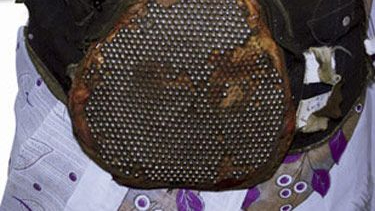
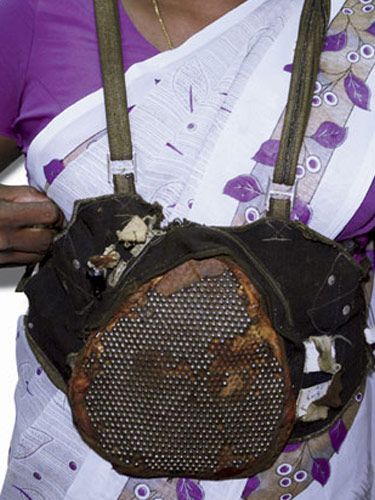
On the day before she set out to blow up the Sri Lankan prime minister, Menake went shopping for a sequined top to hide the vest full of explosives that would turn her into a human bomb. It was the cyanide necklace that gave her away.
The denim vest is a simple garment, tailored to fit the young woman's body. Narrow shoulder straps hold the midsection in place. It's not high fashion, but that doesn't matter, since the first time it's worn will also be the last. The large disk that rests under the breast area is filled with a mass of 3-mm steel balls, and behind that, next to the skin, sits a C-4 plastic explosive. Two detonators, one on either side of her body, require just a gentle tug. Then, in an instant, the vest wearer becomes a human bomb, capable of killing or maiming dozens of people within a 100-foot radius.
Menake's vest fit her well. She tried it on several times to make sure it lay snugly against her chest. She practiced reaching for the detonators without arousing suspicion. She thought hard about the best outfit to disguise its deadly purpose, settling on a sequined top whose shimmer would distract the eye from what lay beneath.
The 27-year-old woman is not what we picture when we hear "suicide bomber." With her long black hair neatly pulled back from her chocolate-colored skin, she is shy, soft-spoken — the kind of person you'd trust with your kids. But Menake is also a member of the Black Tigers, the suicide commando squad of Sri Lanka's Liberation Tigers of Tamil Eelam (LTTE), a terrorist group that has more female suicide bombers than any other organization in the world.
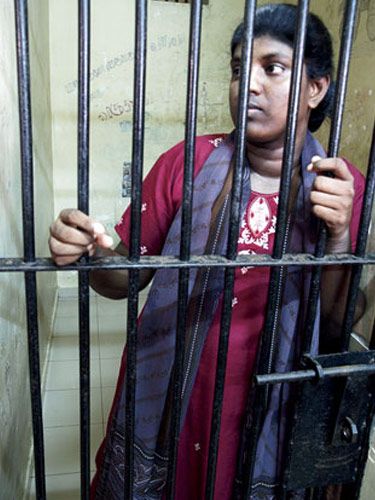
For three days last September, Menake staked out the tree-lined streets of Colombo's richest neighborhood, home to Prime Minister Ratnasiri Wickremanayake. Watching from the shadows, observing the prime minister's mansion from all angles, Menake devised her plan. She memorized his comings and goings, the government sedan he traveled in. The neighborhood — a sort of Embassy Row filled with colonial-style mansions and expansive gardens — was protected by heavily guarded gates and security checkpoints. Menake took note of all this, looking for the weakest link.
Though she kept a low profile, her presence didn't go unnoticed. For one thing, miniskirts and blue jeans dominate the fashion scene in this upscale area of Sri Lanka, and Menake dressed in a traditional shalwar kameez — a long tunic over baggy pants. In those clothes, she could have been a servant, but her face wasn't familiar to the police patrolling the area. For another, her pattern of movement, unlike that of the servants scuttling between homes or to and from the marketplace, was unpredictable. She seemed to appear and vanish, only to re-emerge on another nearby street.
For two days, Menake skillfully evaded the authorities. But on her third day, as she made her final recon mission, she was stopped by guards outside the prime minister's mansion. When her cover story — that she was visiting a sick aunt — didn't wash, they demanded to see her national ID card, something all Sri Lankans over 14 are required to carry. When her card revealed her to be from Jaffna, an LTTE stronghold, the police took Menake into custody.
Stay In The Know
Get exclusive access to fashion and beauty trends, hot-off-the-press celebrity news, and more.
The cyanide necklace was her ultimate downfall. The macabre piece of jewelry — deadly cyanide crystals encased in a small glass vial suspended from a cord around the neck — is worn by every member of the LTTE. Once arrested, the wearer is supposed to bite down on the glass capsule. Through the tiny cuts in the mouth, cyanide races into the bloodstream and blocks the body's absorption of oxygen, leaving the victim fatally convulsing and gasping for air. When the police saw the capsule, they beat Menake unconscious.
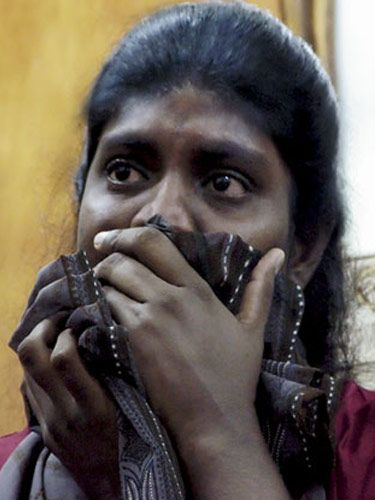
She was then shipped off to the notorious Boosa Detention Center, where prisoners can languish for years without access to lawyers or family members.
Last March, Menake was brought back to Colombo after Chandra Wakishta, director of Sri Lanka's Terrorist Investigation Division, realized Menake's potential value as an informer against her handler. Catch a suicide bomber, and you stop one explosion. Catch a handler, and you stop dozens.
The suicide-bomber vest was the brainchild of Sri Lanka's Tamil Tigers — the design has since been used by Hezbollah, Hamas, and reportedly al Qaeda, and its murderous effects are felt daily in Iraq. The vest was first worn in May 1991, when Thenmuli Rajaratnam, best known by her nom de guerre, Dhanu, blew up herself and 18 bystanders seconds after draping a welcome garland of flowers over the shoulders of India's prime minister, Rajiv Gandhi, at a political rally. Gandhi's violent assassination, caught on film, was televised around the world. In the years since, the LTTE has killed one Sri Lankan president and blinded another. Weekly LTTE suicide bombs cause heavy casualties. They are cheap and efficient: On average, suicide bombings kill four times as many people as other acts of terrorism. Up to 40 percent of these attacks are carried out by women.
If not for its bloody recent history, Sri Lanka might well be a honeymooner's paradise. It is a breathtakingly beautiful country, a teardrop-shaped island off the southern tip of India. But for the past 24 years, the LTTE (comprised mostly of Hindu Tamils but with some Christian members) has been fighting for its own independent state in northern Sri Lanka, which the Sinhala-Buddhist government has been resisting just as fiercely. In that time, 70,000 Sri Lankans have been killed, tens of thousands have fled abroad, and some 600,000 have been displaced within the country. Children on the way to school are regularly abducted and forced to become soldiers. Sri Lanka is also infamous for its vast number of disappeared people — 60,000 abducted and never seen again.
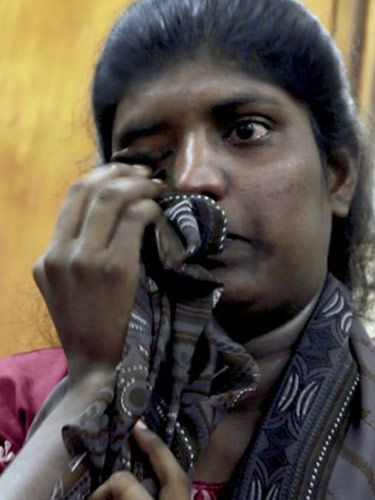
The LTTE is considered one of the most ruthless terrorist organizations in the world, using extortion to raise upwards of $30 million a month from Sri Lankan expatriates. It also maintains a fleet of suicide boats lined with explosives and a burgeoning air division. The planes, smuggled into the country in parts and reassembled in remote jungle bases, were first used to bomb the main airport in March 2007, causing foreign airlines to halt flights to Sri Lanka.
Last August, when I learned that the Sri Lankan government had a failed female suicide bomber in its custody, I wanted to talk to her. I negotiated with the government for months — the Sri Lankans trying to determine if I was a security risk (was I an LTTE sympathizer?), our communication breaking down repeatedly as fighting in the north heated up. Finally, last December, I received the answer I'd been waiting for: an agreement to give Marie Claire an interview — the first they'd ever allowed.
It's a sunny, hot day when I arrive at the prison, a former fortress that seems to attract the heat. Menake is brought up from her isolation cell behind a massive steel door to meet me in the interrogation room at the Anti-Terrorism Division Headquarters in Colombo.
Dressed in a simple maroon tunic and pants and green plastic flip-flops, Menake takes a seat opposite me. (For security reasons, the government asked that her last name not be used.) The blacked-out windows make the space uncomfortably warm. In her unventilated 7' x 5' cell in solitary confinement, Menake has no access to water or a toilet unless she can persuade hostile prison guards to unlock her cell and escort her to both. She sleeps on the bare, tiled floor without a mat or sheet.
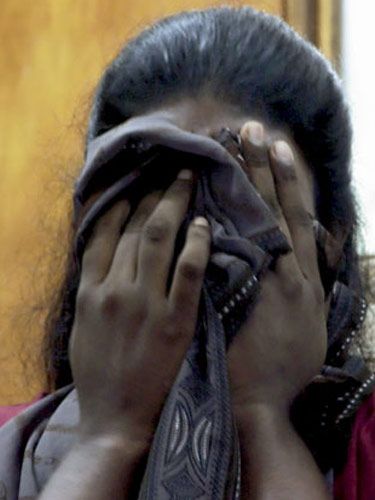
She is clearly surprised to be sitting in an armchair — albeit one that is aged and leaking foam rubber — rather than the usual hard seat in front of the interrogator's desk. When tea is served to me, she appears so unnerved she has to be coaxed into accepting a cup. The hospitality makes her suspicious. In the past, interrogators have threatened her with beatings, rape, and torture.
Menake is hesitant to talk about her life in the LTTE. "Maybe there are Tamil Tigers inside here," she says nervously, through an interpreter. It's not an unreasonable fear — the terrorist organization has successfully infiltrated Sri Lanka's army and police force. As she speaks, three miniature security cameras, monitored by two technicians at computers behind a screen, capture her every word and movement. "I'm frightened if I talk to you, they will find out and kill me. My life is at stake. Maybe one day I will walk out of here, and then what will happen to me?"
The irony of a suicide bomber fearing for her life is not lost on either of us. "I was fed up with life before I was caught," Menake says, her voice so low I have to strain to hear her. "But now, I feel I could lead a normal life. I want to live, not die."
"Do you know the legal penalty for trying to assassinate someone?" I ask, expecting a hardened reply. To my surprise, she begins to cry, burying her face in her lavender-colored dupatta, a shawl which conservative Sri Lankan women use to cover their upper torsos. "The punishment is jail for the rest of my life," she murmurs. She also knows she may hang — capital punishment was reinstated in Sri Lanka two years ago after a government crackdown on suicide bombers.
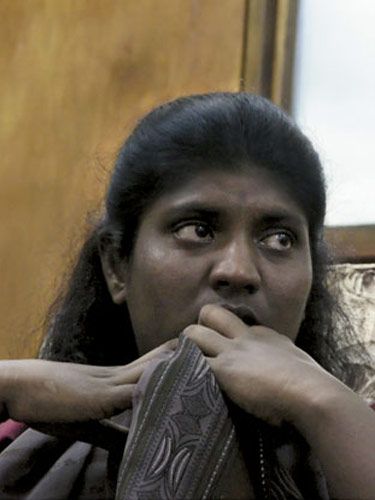
The look on Menake's face turns to wild desperation. She wrings her dupatta in her hands. "I beg you, can't you get me out of this country?" she pleads, almost hysterically. "I want to live. To live the life I might have had before, if I wasn't going to kill myself."
Of course, it's the life she had before that brought her to this point. Home was an impoverished fishing village in northeast Sri Lanka. Her alcoholic father drank more than he fished, and he often hit his wife. Menake was 3 when her mother died from one of his frequent attacks. When Menake was 7, her father raped her repeatedly for four days during a drunken binge. Finally, her grandfather rescued her, and her father disappeared. She never saw him again.
Rape is something many female suicide bombers have in common. Considered spoiled goods and unmarriageable in their patriarchal cultures, they view becoming human bombs as a form of purification by fire. Dhanu, Prime Minister Gandhi's assassin, was also allegedly raped by soldiers from the Indian Peacekeeping Force when it was posted in Sri Lanka for three years.
When Menake was 15, her grandparents died. Her uncle and aunt reluctantly took her in, making it known that she was a burden. Two years later, in 2000, faced with a shortage of fighters, the LTTE levied a human tax — Tamil families were ordered to give a member, male or female, to the organization to be trained for combat. Menake's relatives gave her up for the cause.
"They just said, 'She is yours,'" Menake tells me. "I cried. I begged [the LTTE] not to take me. I told them I didn't want to die so young. But a woman officer told me, 'Sorry, we can't help you. Your relatives said you came here of your own volition.'"
For seven months, the LTTE training camp was Menake's home, with its tents for sleeping and cement-block classrooms, surrounded by dense jungle. She lived with 150 other conscripts, all females in their teens and 20s. She was given the Tamil Tiger green-and-yellow camouflage uniform to wear.
The training-camp rules were rigid: The LTTE prohibits alcohol, tobacco, and drugs. "Unlawful sex" — anything ranging from masturbation to romantic relationships — is banned. Velupillai Prabhakaran, the cultlike founder of the LTTE, executed two of his closest aides after they were caught having intercourse. Marriage was initially outlawed by Prabhakaran, now 53 — until he fell in love with a female prisoner, an agricultural student kidnapped by his guerrillas. The rules were subsequently altered to allow senior cadres to wed. More recently, the LTTE decreed that members may marry once women turn 35 and men turn 40.
For Menake, daily life in the camp was hard and monotonous, starting at 4 a.m. with an hour-long run. "At 5 a.m., we got tea and a bucket of water to wash with," says Menake. "Then we did push-ups." The raw recruits spent hours learning to dismantle, reassemble, and fire their guns. "They watch you closely. Some girls were so fast they won prizes — clothes, a watch. I was always in the middle. If you were slow, you were punished. Sometimes I'd get so tired, I'd fall asleep in class. Then I had to run 20 times around the camp perimeter [about 18 miles] or do jumping jacks until I thought I'd die. You'd be so exhausted, you could hardly move." The rest of the day was divided into sessions of intense political indoctrination and sentry duty.
Listening to Menake talk, it's hard not to sympathize. Her fingernails are bitten down and raw. Her face is streaked with tears and sweat. Her future will be at least as grim as her past has been. And yet, had she not been apprehended, her legacy would have been that of a mass murderer. I ask her how she learned to kill.
Menake remembers her first weapons class: "They gave us sticks at first, just poles, to practice with. Then we got Kalashnikovs. I'd never held a gun before. I knew I would eventually have to kill another human. They said we needed our country, and we would have to take lives to get it. When you're with the LTTE, there's nothing else to think about; it's all they put into your head — the Sinhalese are our enemy, the Sri Lankan government is our enemy. That's all you're allowed to concentrate on. Before, I never thought about whether the Sinhalese people were good or bad. But the officers kept telling us about murders committed by these people. They said we must kill them to regain our Tamil motherland."
Every evening, Menake and the other recruits watched military films, many of them Chinese, some produced by the LTTE. "They were always about war," she says. "The training videos showed us how to fight, how to use weapons, how to kill. Some talked about how, when girls die, they become heroes."
Escape attempts were rare. Those who tried were invariably caught and never seen again. "I don't know what happened to them," says Menake. "We were closed up in the camp, with so many restrictions. It was dangerous to try and escape. The jungle was thick with poisonous snakes and wild elephants. When the elephants were nearby, we'd set fire to bushes or bang metal plates together to scare them away so they wouldn't trample our tents. But even if I could have escaped, who would have taken me in? I was an economic burden. On my own, I would have starved."
At the end of basic training, the recruits were split up and dispatched to other divisions. "I was supposed to get computer training," Menake says, "but that went to a girl who had lost both her legs in the fighting. So I was sent to the intelligence-gathering camp." There, she claims, she spent her days clipping newspaper articles on the conflict. "It was very boring."
In 2002, the LTTE and the government signed a cease-fire agreement, putting Menake and the other Tamil Tigers' lives on ice. Both sides suspected it wouldn't last. During the four years of uncertain peace (throughout which the Tigers continued their military training in secret), Menake wrote to the LTTE secretariat. "I'm willing to become a Black Tiger," she wrote. "It would be an honor. Please let me have your permission to join."
"I was depressed and in pain," she says simply when I press her as to why she made the leap from fighter to would-be martyr. "I had nerve damage to my spine after falling from an LTTE tractor. The doctor said I might become paralyzed when I got older. I thought, Why continue to live? A lot of girls were volunteering to be suicide bombers, so I thought I would, too."
It was more than a year before she received a response that summoned her for an interview. The LTTE, preferring its suicide bombers to be stable (by which it means sufficiently brainwashed to the point of reliable devotion) and idealistic (and therefore likely to carry out their assignments), screens candidates carefully.
In a region where women's rights are few, the LTTE provides an ironic twist: One reason the group is believed to have the highest number of female suicide bombers in the world (and a high percentage of female fighters) is its vocal emphasis on gender equality. Army roles are gender-neutral, and the glory of martyrdom can be bestowed equally upon men and women. But unlike young men who seek the role of suicide bomber with great fanfare from their families, some female bombers gravitate toward the role as a last resort.
"Do you understand you will become a human bomb?" Menake was asked by the Black Tiger leaders in her interview.
"I told them that I did," she says. "I felt I had no other choice." The LTTE calls its suicide missions thatkodai, Tamil for "gift of self." It made her feel, Menake says, that her life still had a purpose.
Then came the training. "We were taught how the vest works, how to jump onto a vehicle in case our target was a bus or a truck," she says. She learned how best to position herself, depending on her target.
"Do you know what a suicide bomb would do to your body when it explodes?" I ask her.
"I know once I put it on, I will kill people, and I will also die," she says unemotionally. "My whole body will be in pieces. But this type of death is very fast."
I ask Menake about her victims — the ordinary people passing by who would be killed or maimed in her attack. "I came to Colombo to destroy, to kill. We are taught to forget the victims," she says. (Her handler remained close by, to make sure she didn't have a change of heart.) "I was just focused on the target. I never had time to think about who else I would kill. I was simply told it was the enemy. It was a job to go and do."
This automaton-like reaction is not unusual. "I knew I was going toward death and just kept walking," says Menake. "You're told this is part of your duty. I didn't think about fear. I was shown what to do, and I never questioned it. We knew there would be a time when we would see today and not see tomorrow. I saw other girls go off who never came back. Then, in the next batch, they took me."
In 2006, after a four-year cease-fire, fighting broke out again in northern Sri Lanka. On August 6, Menake was informed that her target had been chosen — she was being sent to Colombo. Like all suicide bombers, she was given a last supper with an LTTE leader — in this case, Pottu Amman, the LTTE's second in command and head of intelligence. She was offered her choice of meal and selected chicken, fried rice, vegetable curry, and vanilla ice cream. Wanted by Interpol and the Sri Lankan government, Amman seemed like a movie star to Menake.
"He was tall and handsome," she says, her voice lighting up for the first time. "We had a last photograph taken together" — the idea being, once she was dead, the photo, decorated with flowers, would go on display at the local clock tower, as happened with the images of other suicide bombers before her. Amman told her she would be known as a mahaveera, or "great warrior," and venerated in a way she'd never been in life. Only then would she be given a military rank, based on the importance of her target.
The LTTE financially rewards the families of suicide bombers by paying for a surviving brother to go to college, for instance, or helping a family build a home. "When you die, your relatives get the honor. But my aunt and uncle betrayed me," Menake says angrily, "so I said no to any money for them. It would have been different if my mother were still alive."
After the hour-long dinner, Amman was all business. "He said, 'We expect you to do a good job. Don't change your mind. Don't mess up. We're watching you,'" Menake recalls. The following day, she headed to the capital, where she planned to buy the sequined shalwar kameez.
I imagine this small, stocky woman, who barely had enough money to buy basic clothing, splurging on a festive top that Sri Lankans wear to weddings — the sequins glittering in the sunlight as she headed off to die. I ask her if she considered changing her mind at any point.
"If I felt sad, it was because I would never have the opportunity to have a family and children, to hold my own baby in my arms. That was my biggest sorrow," she says. "The difference between Black Tigers and normal Tamil Tigers is that normal Tigers don't know when they will be killed. Black Tigers know only their ultimate achievement."
At the beginning of September, Menake checked out of the Appolli Inn, a low-cost lodge on the edge of Colombo, and caught a bus into town for a final reconnaissance of the prime minister's home. As she approached the building, three police officers stepped from their security booth and stopped her in the street. Menake's suicide mission was over.
Later, after Menake has left the interrogation room, officials carry in a crumpled-up piece of clothing. When they stretch it out on the table in front of me, I see the vest. As I stare at it, all I can think is, Who made this? Did they ever stop to think about the young woman who would wear it?
I place a call to Irasiah Ilanthirayan, the LTTE military spokesperson. (Despite their secretive attacks, the LTTE is remarkably visible on the global political scene — a few strategically placed phone calls put me in direct contact with its headquarters in Kilinochchi, in the northern region of the country, although cell and e-mail communication with the LTTE is frequently disrupted by the Sri Lankan government.) I ask Ilanthirayan how his organization justifies sending young women to kill innocent civilians and, ultimately, themselves. "Our suicide bombers do not take their own life, but give it to the cause," he says. "They are not killers, they are givers. They give their lives for the Tamil nation."
And the cyanide? "Even myself, I still wear it," Ilanthirayan tells me. "Our secrets should be protected. My son, my father, and my sons and daughters to follow would prefer to die before bowing down in front of the enemy."
As for a solution to the conflict, Ilanthirayan sees only one: "We were two nations, Tamil and Sinhalese, before the European [colonials] came. And two nations is a very good model, a very good solution to this problem."
The conflict has become increasingly intractable. While the Sri Lankan government officially states that a military solution is not the answer, it launched major offensives against the LTTE this past winter and spring. It also stands accused of bombing a Tamil orphanage (the government claims it was an LTTE training camp) and shooting 17 Tamil aid workers point-blank in the head. In response, the U.S. and U.K. suspended aid to the Sri Lankan government.
The day before I left Sri Lanka, I learned that two suicide-bomber vests had been found during a security sweep of a train coming into Colombo. The bombers, taught not to stand near their lethal cargo, planned to retrieve the vests upon arrival and disappear into the throng of passengers disembarking at the Fort Train Station, the city's main terminus. This time, at least, the antiterrorism unit got there first.